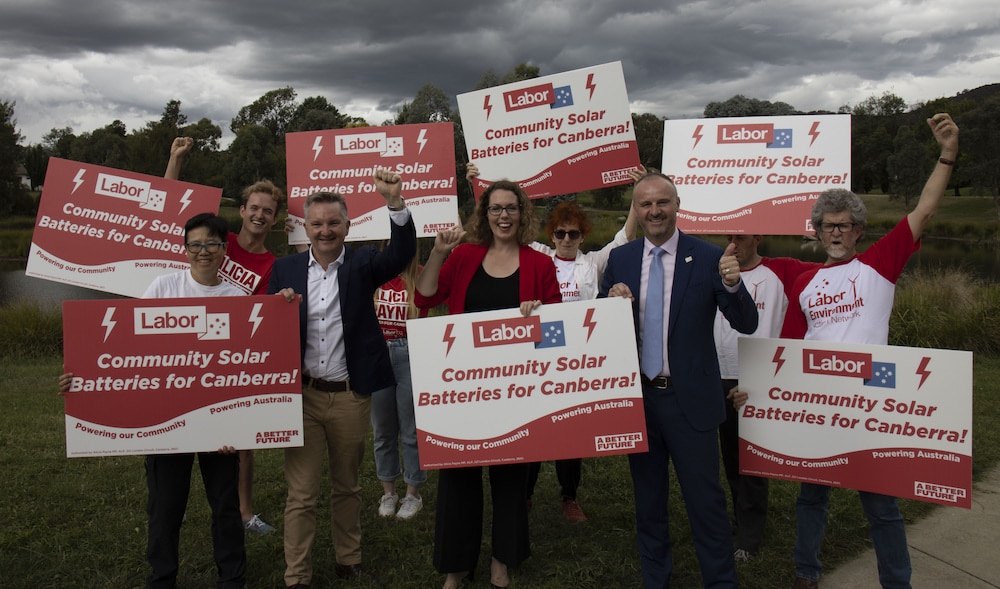Federal Labor has promised to install community batteries in Casey, Dickson, and Fadden if the party wins this year’s federal election, Shadow Energy Minister Chris Bowen and local Labor MPs announced today.
“This is great public policy,” said Chief Minister Andrew Barr (ACT Labor). “It complements work that’s underway at a state and territory level. It’s practical. It’s deliverable. It will help create jobs, put downward pressure on power prices, and it reduces emissions.”
But Liberal Senator for Canberra Zed Seselja said that Labor energy policies drove up power prices.
More than a quarter of ACT households had rooftop solar, but could not reap the full benefits because they could not afford batteries, said Alicia Payne MP, member for Canberra (Labor).
Across Dickson, Fadden, and Casey, Mr Bowen stated, there were 6,000 households with solar panels on their roofs, but fewer than 300 batteries.
Community batteries, Ms Payne said, would store energy by day so households could draw from it by night. Renters and apartment dwellers who could not get their own rooftop solar panels would be able to draw from the battery. It wouldbring down power prices and reduce emissions, she said.
“This is an important part of the national effort … and the ACT has a big role to play in that,” Mr Bowen said. “Given its importance in leadership in terms of renewable energy and the strong take-up of solar panels across the ACT, the next step is to store more of it.”
Mr Barr endorsed the project. It was, he said, “a really significant and important commitment” from Federal Labor, which complemented the ACT party’s policy agenda.
“I can say with absolute certainty that there is a massive appetite in our community to be part of a really significant program of climate action,” he said.
Many Canberrans had taken part in the ACT Government’s Sustainable Household Scheme, or wanted to be part of the Big Canberra Battery project – a distributed network of batteries across the ACT in three key streams, one stream being community-level batteries.
“What is being announced today will enable us to do more and do it more quickly,” Mr Barr said.
The battery sites had been chosen in consultation with the ACT Government, he said; Evoenergy had assessed where the batteries needed to be across the ACT’s distributed network.
Mr Bowen denied that Labor had targeted Labor-held or Green-leaning seats for the battery announcement; the party had promised batteries for Coalition-voting seats in Queensland and Western Australia which it was unlikely to win.
John Grimes, CEO of the Smart Energy Council, said the proposal was “fantastic”.
“The biggest cost of living pressure in Australia beyond petrol is power bills. People struggle with this every day.” The batteries would give Canberrans “a saving to their power bill, in the daytime and at night-tie, as well – 24-hour cheap, renewable, clean electricity.”
“Labor’s record on electricity pricing is clear,” Senator Seselja retorted. “The Labor-Greens alliance in the ACT have been driving up the cost of electricity here in Canberra. When Labor were last in Government, year on year household electricity costs rose every single quarter for 23 consecutive quarters.
“While consumers across the country are reaping the benefits of substantially lower wholesale prices supported by the strong policies of the Liberal-National Government, Canberrans are facing massive power price hikes due to deliberate policy decisions of this Labor-Greens alliance.
“The Liberal National-Government is taking decisive action to deliver affordable, reliable energy for Australians, including building the 2,000 megawatt Snowy 2.0, that is delivering bill relief for consumers across the country.”
Senator Seselja referred to criticism of the ACT Government’s policy from the Energy Networks Australia, the national industry body representing Australia’s electricity transmission and distribution and gas distribution networks.
The ENA had found last year that the cost of the ACT’s large-scale feed-in tariff would increase by 133 per cent on 1 July 2021 from $65 million to $153 million.
“The sheer magnitude of customer impact from this single policy provides a cautionary tale about bespoke state politics rather than developing least-cost national solutions,” it stated last year.
LobbyMap notes that ENA broadly supports action on climate change, but opposes more ambitious policies, while Pure Electric, a renewable energy company, considers it a fossil fuel industry lobby group.
Get all the latest Canberra news, sport, entertainment, lifestyle, competitions and more delivered straight to your inbox with the Canberra Daily Daily Newsletter. Sign up here.



